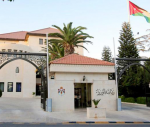You are here
Israeli strikes on Hizbollah, Hamas leaders escalate regional tensions amid Gaza war
Jul 31,2024 - Last updated at Jul 31,2024
The tragic strike that killed a dozen youths last weekend at the Israeli occupied Druze town of Majdal Shams prompted Israeli strikes against Hizbollah leader Fuad Shukr in Beirut and Hamas political chief Ismail Haniyeh in Tehran. While Shukr is said to have survived, Haniyeh did not. Israel’s tactically timed attack in Beirut pulled the focus away from the main regional Gaza war front to Lebanon and undermined talks on a ceasefire in Gaza and release of Israeli captives. While Hizbollah has denied targeting Majdal Shams, Lebanese commentators suspect the strike with an Iranian-manufactured "dumb" unguided rocket could have been a mistake or driven off course by an Israeli anti-missile interceptor.
The last thing Hizbollah would want was to strike Majdal Shams. Eighty per cent of the Golan residents of the Israeli-occupied and annexed area are Syrians who refuse Israel's offer of citizenship. Most are loyal to the government in Damascus. Hizbollah has spent blood and treasure fighting on its side in the civil/proxy conflict.
Israel has blamed the Lebanese movement and, as usual, has been backed up by the loyal Biden administration. UN observers deployed on the line between the occupied Golan and Syria are said to be investigating. Whatever the truth on this episode, Israeli prime minister Binyamin Netanyahu is the beneficiary. Although 70 per cent of Israelis want him to step down, he counts on war to maintain him in office and stave off criminal prosecution for fraud, bribery and breach of trust. Although his trial has stumbled along since May 2020 and is ongoing, on July 9 this year, he appealed to the court to delay his testimony until March 25, 2025, as he preoccupied by the war. The judges ruled he must begin testifying on December 2 war or no war. If he is found guilty, he could have to serve up to 10 years in prison or pay a hefty fine for the bribery case alone.
While international actors attempt to de-escalate the secondary war front to prevent a full-scale conflict in Lebanon which could draw in Syria, Iraq and Yemen, the Israeli military continues to pound Gaza, kill Gazans, deprive them of food, water, and medicine. Last week, the US said Israel and Hamas were closer than ever to a ceasefire deal despite Netanyahu's new, unexpected, last-minute conditions which held up agreement. His aim was to scupper the ceasefire/hostage deal and blame Hamas for rejecting his conditions.
He demands Israeli control of the Gaza-Egypt border zone, known as the Philadelphi Corridor, and of the wide "Netzarim Corridor", which bisects Gaza from east to west. The former would give Israel control of everyone and supplies entering Gaza while the latter would enable Israel's army to regulate the homeward flow of northern Gazans displaced to the south and give Israeli troops easy access to the whole of the strip. Netanyahu has also rejected a permanent ceasefire and vowed to continue fighting until Hamas is defeated although the Israeli military has failed to achieve this objective in 10 deadly and devastating months.
Since he issued these demands, Israel has issued evacuation orders for 86 per cent of Gaza's territory and squeezing 2.3 million Gazans into 14 per cent where there are no resources to sustain life.
Under pressure from desperate Gazans and mediators, Hamas has accepted a temporary ceasefire as a first step towards an end to the war and has called for UN and international guarantees on this issue. Netanyahu is also under rising pressure at home and abroad. Relatives of Hamas' 111 captives demand a ceasefire and their release. They are supported by millions of Israelis who have had enough of a one-sided conflict which is Israel's second longest after its 12-month war of establishment in 1948.
On the international front, Netanyahu has been accused of war crimes. Israel's friends, including even Donald Trump, argue that it has lost the public relations battle. Winning has always been an existential interest for Israel. As a result of the Gaza war, majorities in Britain, Italy, and Spain urge implementation of International Criminal Court (ICC) arrest warrants for Netanyahu and Defence Minister Yoav Gallant.
Netanyahu's determination to wage war for as long as he can to avoid prison or a fine cannot compare with a life sentence if he is tried and convicted for war crimes by the ICC or a special tribunal like that dealing with the war crimes committed in the former Yugoslavia. He counts on Western leaders' opposition to prosecution of Israeli leaders to save them from trial and imprisonment.
However, on Monday YouGov published a poll which showed that 57 per cent of respondents in Italy and 54 per cent in Britain backed the ICC warrants. Pluralities in France, Sweden, Denmark, Germany and the US said they supported such action. The survey also revealed that 63 to 74 per cent of respondents in these countries — with the exception of the US — said Israel had, allegedly, committed war crimes. In the US, the figure was 49 per cent and is reaching the tipping point majority. This shows that he and Gallant have lost immunity among citizens of the countries Netanyahu and Gallant count as immunisers from accountability.














Add new comment